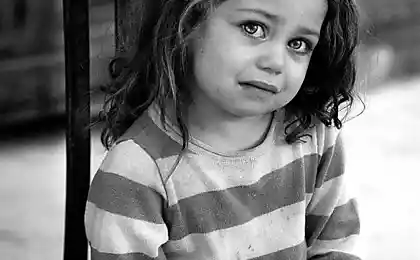530
Why do we yell at children
Why parents with or without show aggression towards their children? What will grow from the child all the time you pull? How to deal with this situation? Responsible psychologist Lyudmila Petranovskaya.
"How to distinguish between Soviet (post-Soviet) parents? If their child stumbles and falls, no one rushed to help, be calm. For him to start to yell. Then you can regret, but not necessarily. Instead, scolding continues: "How many times have you been told that you are under feet looking? To speak or not?!“.
Anyway, the first impulsive reaction is to snarl, to pull, to hiss. And then shake like you want a painful hit. Very strange, if you think about it. It is clear that he did not mean to," says psychologist Lyudmila Petranovskaya.
Thirty million seven hundred seventy nine thousand four hundred forty six
— Lyudmila Vladimirovna, is a measure of dislike for the child?
— I wouldn't say that. At other times, in other situation it is evident that the parents love the child. My mother, incidentally, is also always did, although I loved me of course, and in other cases were always ready to regret. I remember in my childhood such a huge surprise, I could not understand the logic.
Fright about the fact that the child fell and hurt himself, the irritation and anger of the parents can not explain. It is often immediately evident that nothing terrible has happened and there is no damage not only the child but also his knees.
It would be possible to somehow explain what is happening if the parents are somewhere in a hurry, and suddenly — an unexpected hitch. The irritation is understandable.
But the irritation and Creek appear and manifest itself, even if nobody is in a hurry and the family is just walking.
Big brother is watching you
— Then where does this aggression towards their own children, unfounded?
— There is a constant third in the relationship. That is, the parent is not alone with the child, and in the company of that certain third force, which monitors how well he is doing his parental duties.
And this one may be real, for example, in the form of strict grandmothers who strive to make a point or state guardianship or teacher or someone else, and virtual. So "big brother" inside echo the views of the mother who believes that her daughter is a bad mother.
So every time when something happens and a strong dependence on this "third" parent covers intense anxiety. And at this moment not really able to think about what child. All his thoughts boil down to how he justified in the sight of the terrible terrible "third" that can cancel it, as a parent, saying something like, "You look like all you terrible: the child fell, my knees stained with dirt. Then you parent?!»
That is, the reaction is completely irrational. Not arise in a situation when the child really misbehaves, and when it is more logical like would be to rush to the rescue, regret. Instead, the child falls aggression.
— Why the fear of being a bad parent, and not, say, a bad employee?
— We are responsible for your child. Although some women spread it to men. For example, they feel very bad when their husband in the presence of strangers looks on their opinion, stupid or not good enough. And feel responsible for it. But it's still a little different.
And the child goes on the offensive. Because when something happens, parents feel that they are exposed as losers, as a no-good father and mother.
A child's punching bag
If adult stress, for example, at work, why he often begins to fall apart is on the child, not on older relatives, friends?
— In a situation of stress the person may fall on anyone and on anything. And who make the claim of a neighbor, and called by phone for advertising purposes.
The child often falls through? Because it is safer. Before to beat an adult — still think about it. And the child won't fight, and because it is the most convenient option.
— There are times when a child constantly serves as a psychological punching bag, where adult "relieves stress"?
— There is a pathological situation when this becomes the norm. Adult — a hard life, it's bad, and then there's "come home — where you sit". And the corresponding reaction. But it's still the situation is not normal for people from dysfunctional families where, for example, dad alcoholic, mom depressed and so on.
And we are talking about ordinary families.
Women who have problems with personal life, no husband, often splash out the aggression in children?
— When the woman has no husband, she has no resource on which to draw. There is no one who will regret, will support, Pat on the head.
When a single woman raises a child, she has a balance of "give — take" is strongly violated. She gives, gives, gives, but no one would let her. Anything, from coffee in bed, ending with gifts, kind words, hugs, concrete assistance…
Therefore, it is clear that stress is accumulating faster, and it is unclear how to remove it.
— How the child may reflect the fact that the parents constantly disrupted his irritation, fatigue, fears?
Constantly is a relative term. It all depends on how consistently and what is happening in the rest of the time. Sometimes if a parent is unable to hold back, and all the rest of the time between him and the child a good relationship, then nothing to worry about.
And yet — what does it mean "to break", in what form. It's one thing when a parent could not resist, angrily shouted, and the other snapped and beat them.
The nervous generation?
— How is the aggression pouring on the aggression of the universal that is present in today's society? Not you will grow more nervous generation?
Society has become more aggressive than it was before. Just the aggression became visible, and she was very much trapped.
But I don't think that children will grow more nervous. Because, among other things, they now and get more from their parents than those in their time from their.
Looking around, I see that was a lot of parents who are trying to spend more time with their children; men, largely returned to family and pay more attention to the children.
Between those unpleasant episodes when the parents broke down and yelled at, or slapped, they communicate more and deeper. So I think, your children will be better than us, more confident and open towards the world.
— It turns out, the generation of chronic deprivation raise children better than raising them?
— This generation is trying to have children was not deprivation. Hence the acceptance of children, informal, sincere, warm relationship with them. Other than when it was when it was considered: the child should only be disciplined. Many families did not have a deeper contact between children and parents.
Parents today pay attention to the emotional experiences of the child, do not consider it constantly to blame, try to understand his situation, can ask for forgiveness.
— Is there a way to control myself not to throw out the aggression on the child?
Is to control yourself when you're really in a strong stress, is a complex task. So it is better to look to their feelings, to respect yourself and not to push yourself to the stress. Or if made, is to think about where you can get help. No husband, so have friends, parents, siblings, therapist, finally... it is Impossible to bring themselves to a state ride a horse when you no longer care what happens and you should only touch as you are hysterical. Need to answer not only for the child but also for yourself.
Poligraficheski fear
— How to get rid of the "third" in the relationship with the child?
— To understand how this "third" is really dangerous. Often the fears are greatly exaggerated. For example, the hysteria: "the juvenile justice system comes soon I'll take all kids!"Sometimes, "the third" — your own parent, you should understand, no matter what mom thought about how I'm raising my kids, I actually educate them well. When you realize where is your fear, then to work with it. For example, the task of the teacher is not to judge your parental abilities, and to teach the child.
— But the reasons for this fear are often underlying the surface…
— Yes, he often has roots in the past. Many generations have lived in a situation where the boundaries of family were broken. Children did not belong to the parents, parents could not guarantee them any security.
And this experience of understanding, when you realize that you and your child can do anything, and you will not be able to protect him recently. It is experienced by our grandparents and can't respond tonight. They broadcast us your fear arising from real experience.
I once spoke with a woman who spent her early childhood in a Nazi concentration camp on the territory of Moldova. And her mother, who was there with his two kids (thank God, all survived), and then the rest of his life, as soon as the kids had a theme of discontent, the slightest protest, began to get nervous and saying: "quiet, Quiet! No need to talk about it".
She had any fear of attracting attention to his family, the slightest protrusion of the common quiet series. And it can be understood. After seven years and four daughters through the horrors of the concentration camp, but managed to save them, she learned to be invisible.
I repeat that this was recently, still living children who happened to be directly in such situations. It is clear that this cannot halloo to one another…
— Today, the family feels more secure? All of these stories with social patronage and so on, isn't this strengthens poligraficheski fear?
— On the one hand, our government has repeatedly shown itself to be like a bull in a China shop, which will help so that all who failed to escape, will not find it. On the other hand there is irrational hysteria. Sometimes, people have experienced a burn, like all externally healed, and touch this place of hurt.
And here. Apparently so acute all have experienced the family — unit of society" with the broken borders, when the parents could not have children to talk about their values, about their ancestors, relatives who were repressed. It was necessary to control everything…
Jonas Harrison: Stop doing these houses are 3 dangerous things!
Pink and black glasses: whether it is Necessary to protect children from the truth of life
It — burn. And he quickly passes, we are still in this place all sensitive.
It takes a generation or two, until set at least a tolerable sensitivity.
And now we have all, I repeat, like fresh skin after a burn. Touches it hurts. And this should be treated carefully, carefully. Do not forget about caring for ourselves, each other.published
Authors: Lyudmila Petranovskaya, Oksana Golovko
P. S. And remember, only by changing their consumption — together we change the world! ©
Source: www.pravmir.ru/pochemu-my-krichim-na-detej-bez-prichiny-psixolog/
"How to distinguish between Soviet (post-Soviet) parents? If their child stumbles and falls, no one rushed to help, be calm. For him to start to yell. Then you can regret, but not necessarily. Instead, scolding continues: "How many times have you been told that you are under feet looking? To speak or not?!“.
Anyway, the first impulsive reaction is to snarl, to pull, to hiss. And then shake like you want a painful hit. Very strange, if you think about it. It is clear that he did not mean to," says psychologist Lyudmila Petranovskaya.
Thirty million seven hundred seventy nine thousand four hundred forty six
— Lyudmila Vladimirovna, is a measure of dislike for the child?
— I wouldn't say that. At other times, in other situation it is evident that the parents love the child. My mother, incidentally, is also always did, although I loved me of course, and in other cases were always ready to regret. I remember in my childhood such a huge surprise, I could not understand the logic.
Fright about the fact that the child fell and hurt himself, the irritation and anger of the parents can not explain. It is often immediately evident that nothing terrible has happened and there is no damage not only the child but also his knees.
It would be possible to somehow explain what is happening if the parents are somewhere in a hurry, and suddenly — an unexpected hitch. The irritation is understandable.
But the irritation and Creek appear and manifest itself, even if nobody is in a hurry and the family is just walking.
Big brother is watching you
— Then where does this aggression towards their own children, unfounded?
— There is a constant third in the relationship. That is, the parent is not alone with the child, and in the company of that certain third force, which monitors how well he is doing his parental duties.
And this one may be real, for example, in the form of strict grandmothers who strive to make a point or state guardianship or teacher or someone else, and virtual. So "big brother" inside echo the views of the mother who believes that her daughter is a bad mother.
So every time when something happens and a strong dependence on this "third" parent covers intense anxiety. And at this moment not really able to think about what child. All his thoughts boil down to how he justified in the sight of the terrible terrible "third" that can cancel it, as a parent, saying something like, "You look like all you terrible: the child fell, my knees stained with dirt. Then you parent?!»
That is, the reaction is completely irrational. Not arise in a situation when the child really misbehaves, and when it is more logical like would be to rush to the rescue, regret. Instead, the child falls aggression.
— Why the fear of being a bad parent, and not, say, a bad employee?
— We are responsible for your child. Although some women spread it to men. For example, they feel very bad when their husband in the presence of strangers looks on their opinion, stupid or not good enough. And feel responsible for it. But it's still a little different.
And the child goes on the offensive. Because when something happens, parents feel that they are exposed as losers, as a no-good father and mother.
A child's punching bag
If adult stress, for example, at work, why he often begins to fall apart is on the child, not on older relatives, friends?
— In a situation of stress the person may fall on anyone and on anything. And who make the claim of a neighbor, and called by phone for advertising purposes.
The child often falls through? Because it is safer. Before to beat an adult — still think about it. And the child won't fight, and because it is the most convenient option.
— There are times when a child constantly serves as a psychological punching bag, where adult "relieves stress"?
— There is a pathological situation when this becomes the norm. Adult — a hard life, it's bad, and then there's "come home — where you sit". And the corresponding reaction. But it's still the situation is not normal for people from dysfunctional families where, for example, dad alcoholic, mom depressed and so on.
And we are talking about ordinary families.
Women who have problems with personal life, no husband, often splash out the aggression in children?
— When the woman has no husband, she has no resource on which to draw. There is no one who will regret, will support, Pat on the head.
When a single woman raises a child, she has a balance of "give — take" is strongly violated. She gives, gives, gives, but no one would let her. Anything, from coffee in bed, ending with gifts, kind words, hugs, concrete assistance…
Therefore, it is clear that stress is accumulating faster, and it is unclear how to remove it.
— How the child may reflect the fact that the parents constantly disrupted his irritation, fatigue, fears?
Constantly is a relative term. It all depends on how consistently and what is happening in the rest of the time. Sometimes if a parent is unable to hold back, and all the rest of the time between him and the child a good relationship, then nothing to worry about.
And yet — what does it mean "to break", in what form. It's one thing when a parent could not resist, angrily shouted, and the other snapped and beat them.
The nervous generation?
— How is the aggression pouring on the aggression of the universal that is present in today's society? Not you will grow more nervous generation?
Society has become more aggressive than it was before. Just the aggression became visible, and she was very much trapped.
But I don't think that children will grow more nervous. Because, among other things, they now and get more from their parents than those in their time from their.
Looking around, I see that was a lot of parents who are trying to spend more time with their children; men, largely returned to family and pay more attention to the children.
Between those unpleasant episodes when the parents broke down and yelled at, or slapped, they communicate more and deeper. So I think, your children will be better than us, more confident and open towards the world.
— It turns out, the generation of chronic deprivation raise children better than raising them?
— This generation is trying to have children was not deprivation. Hence the acceptance of children, informal, sincere, warm relationship with them. Other than when it was when it was considered: the child should only be disciplined. Many families did not have a deeper contact between children and parents.
Parents today pay attention to the emotional experiences of the child, do not consider it constantly to blame, try to understand his situation, can ask for forgiveness.
— Is there a way to control myself not to throw out the aggression on the child?
Is to control yourself when you're really in a strong stress, is a complex task. So it is better to look to their feelings, to respect yourself and not to push yourself to the stress. Or if made, is to think about where you can get help. No husband, so have friends, parents, siblings, therapist, finally... it is Impossible to bring themselves to a state ride a horse when you no longer care what happens and you should only touch as you are hysterical. Need to answer not only for the child but also for yourself.
Poligraficheski fear
— How to get rid of the "third" in the relationship with the child?
— To understand how this "third" is really dangerous. Often the fears are greatly exaggerated. For example, the hysteria: "the juvenile justice system comes soon I'll take all kids!"Sometimes, "the third" — your own parent, you should understand, no matter what mom thought about how I'm raising my kids, I actually educate them well. When you realize where is your fear, then to work with it. For example, the task of the teacher is not to judge your parental abilities, and to teach the child.
— But the reasons for this fear are often underlying the surface…
— Yes, he often has roots in the past. Many generations have lived in a situation where the boundaries of family were broken. Children did not belong to the parents, parents could not guarantee them any security.
And this experience of understanding, when you realize that you and your child can do anything, and you will not be able to protect him recently. It is experienced by our grandparents and can't respond tonight. They broadcast us your fear arising from real experience.
I once spoke with a woman who spent her early childhood in a Nazi concentration camp on the territory of Moldova. And her mother, who was there with his two kids (thank God, all survived), and then the rest of his life, as soon as the kids had a theme of discontent, the slightest protest, began to get nervous and saying: "quiet, Quiet! No need to talk about it".
She had any fear of attracting attention to his family, the slightest protrusion of the common quiet series. And it can be understood. After seven years and four daughters through the horrors of the concentration camp, but managed to save them, she learned to be invisible.
I repeat that this was recently, still living children who happened to be directly in such situations. It is clear that this cannot halloo to one another…
— Today, the family feels more secure? All of these stories with social patronage and so on, isn't this strengthens poligraficheski fear?
— On the one hand, our government has repeatedly shown itself to be like a bull in a China shop, which will help so that all who failed to escape, will not find it. On the other hand there is irrational hysteria. Sometimes, people have experienced a burn, like all externally healed, and touch this place of hurt.
And here. Apparently so acute all have experienced the family — unit of society" with the broken borders, when the parents could not have children to talk about their values, about their ancestors, relatives who were repressed. It was necessary to control everything…
Jonas Harrison: Stop doing these houses are 3 dangerous things!
Pink and black glasses: whether it is Necessary to protect children from the truth of life
It — burn. And he quickly passes, we are still in this place all sensitive.
It takes a generation or two, until set at least a tolerable sensitivity.
And now we have all, I repeat, like fresh skin after a burn. Touches it hurts. And this should be treated carefully, carefully. Do not forget about caring for ourselves, each other.published
Authors: Lyudmila Petranovskaya, Oksana Golovko
P. S. And remember, only by changing their consumption — together we change the world! ©
Source: www.pravmir.ru/pochemu-my-krichim-na-detej-bez-prichiny-psixolog/
A huge number of great people were desperate slowpoke
12 tips from grandmother Zelda to their descendants























